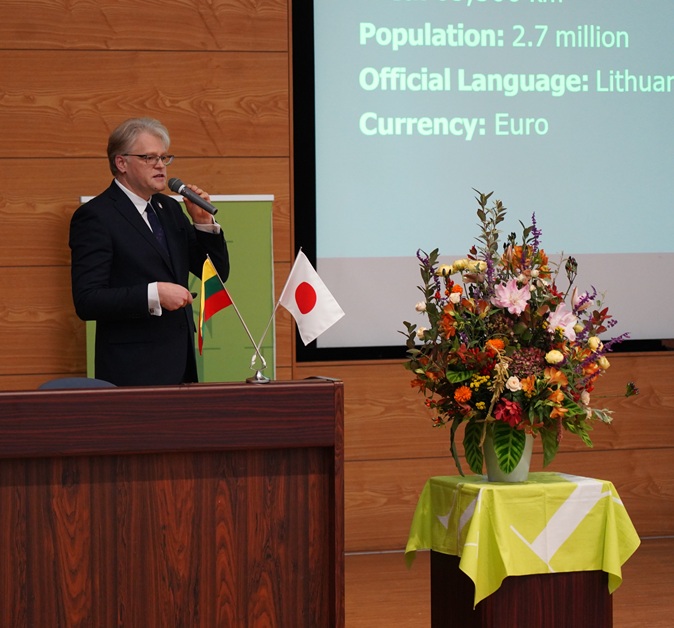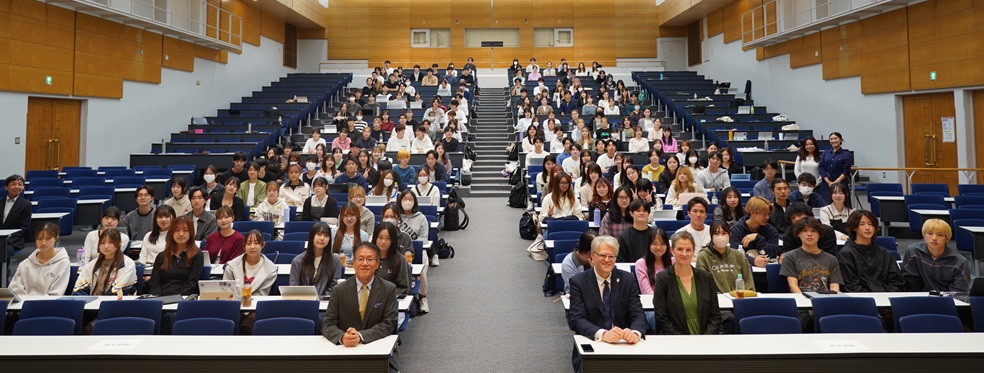Lithuania Unveiled: Culture, Nature, Policy, and Future Challenges
2025.11.21
Yokohama City University annually hosts lectures by professionals who play important roles internationally. The lectures focus on the global trend and position of Japan in the global society.
On 15 October 2025, His Excellency Dr. Aurelijus Zykas, Ambassador of the Embassy of the Republic of Lithuania in Japan, was invited to give a lecture on “Lithuania Unveiled: Culture, Nature, Policy, and Future Challenges”. The lecture was moderated by Dr. Masazumi Ao, Professor of YCU’s School of International Liberal Arts and Hina Ishikawa, 4th-year undergraduate student of YCU’s School of International Liberal Arts. It was attended by 215 participants.
The exchange between YCU and Lithuania began with academic connections between faculty and students. Research exchanges between faculty members in Kaunas, a city with many Japanophiles, have continued for 25 years. Furthermore, a student exchange program with Kaunas University of Technology is scheduled to begin next year, anticipating further deepening of our activities with Lithuania. This lecture was held as part of these international exchange activities.
The exchange between YCU and Lithuania began with academic connections between faculty and students. Research exchanges between faculty members in Kaunas, a city with many Japanophiles, have continued for 25 years. Furthermore, a student exchange program with Kaunas University of Technology is scheduled to begin next year, anticipating further deepening of our activities with Lithuania. This lecture was held as part of these international exchange activities.


From the beginning of the lecture, the ambassador engaged students directly, encouraging them to speak up and even teaching them greetings in Lithuanian. This created a fun, interactive exchange, enveloping the venue in a warm atmosphere. He then introduced Lithuania's geography and culture, highlighting that it is one of the Baltic states with a population of approximately 2.7 million, a country rich in nature where one-third of the land is covered by forests and it boasts over 6,000 lakes. He also mentioned how Lithuania, known as the “Land of Balloons”, successfully blends tradition with modernity.
Additionally, a wide range of topics were discussed, including history, political systems, economics, and education. The series of events leading to the restoration of independence from 1987 to 1991, following the prosperity of the Grand Duchy of Lithuania from the 13th to the 18th century and subsequent Russian imperial and Soviet rule, was explained as the “Singing Revolution”. As a current member of the EU and NATO, the country was highlighted for its emphasis on democracy and international rules, with a focus on achieving both political stability and innovation.
Economically, in addition to high-tech exports such as electrical machinery, optical equipment, and pharmaceuticals, the ICT and life sciences sectors are experiencing rapid growth, with approximately 1,000 startups and 9 unicorn companies emerging. Furthermore, the presentation drew attention to Lithuania’s societal maturity and international contributions, including a large pool of highly qualified talent, women's participation in STEM fields, energy self-sufficiency through renewable energy, and support for Ukraine.
Concluding the lecture, the Ambassador touched upon the diplomatic ties established with Japan in 1922, cooperation in IT and bio sectors, and the bonds between the two nations through the achievements of Chiune Sugihara, expressing his hopes for future university exchanges.
Additionally, a wide range of topics were discussed, including history, political systems, economics, and education. The series of events leading to the restoration of independence from 1987 to 1991, following the prosperity of the Grand Duchy of Lithuania from the 13th to the 18th century and subsequent Russian imperial and Soviet rule, was explained as the “Singing Revolution”. As a current member of the EU and NATO, the country was highlighted for its emphasis on democracy and international rules, with a focus on achieving both political stability and innovation.
Economically, in addition to high-tech exports such as electrical machinery, optical equipment, and pharmaceuticals, the ICT and life sciences sectors are experiencing rapid growth, with approximately 1,000 startups and 9 unicorn companies emerging. Furthermore, the presentation drew attention to Lithuania’s societal maturity and international contributions, including a large pool of highly qualified talent, women's participation in STEM fields, energy self-sufficiency through renewable energy, and support for Ukraine.
Concluding the lecture, the Ambassador touched upon the diplomatic ties established with Japan in 1922, cooperation in IT and bio sectors, and the bonds between the two nations through the achievements of Chiune Sugihara, expressing his hopes for future university exchanges.
After the lecture was held a Q&A session during which participating students asked questions about renewable energy and energy self-sufficiency. The ambassador cited Lithuania's ability to overcome its electricity shortage as stemming from overcoming the difficulty of gaining public trust, recognizing that renewable energy adoption was essential for the nation's survival, and setting clear goals and strategies that were steadily implemented. He also pointed out how citizen-participation policies, such as household solar power generation, are decentralizing electricity production nationwide. Regarding electricity self-sufficiency, nuclear power plants were shut down in line with commitments made upon joining the EU, and reintroduction lacks public support, making renewable energy the current priority. Independence has also improved by halting electricity imports from Russia by 2025 and integrating into the EU power grid. Regarding the balance with forests, while some forest loss occurs due to the construction of wind and solar power facilities, the environmental impact is less than that of nuclear or fossil fuels. In Lithuania solar panels are mostly built on the individual roofs or fields (and sea in case of wind turbines), so no forests are harmed in the process. Ambassador Zykas proudly mentioned that if a choice must be made, Lithuanians will choose the better option.


Lecture by Dr. Aurelijus Zykas, Ambassador of the Embassy of the Republic of Lithuania in Japan
Day & time: Wednesday, 15 October 2025, 16:10–17:40
Venue: Seagull Hall, 3rd Floor, Seagull Center, Kanazawa-hakkei Campus
Theme: Lithuania Unveiled: Culture, Nature, Policy, and Future Challenges
Lecturer: Dr. Aurelijus Zykas, Ambassador of the Embassy of the Republic of Lithuania in Japan
Moderator: Dr. Masazumi Ao, Professor, School of International Liberal Arts, Yokohama City University
Hina Ishikawa, 4th-year undergraduate student, School of International Liberal Arts, Yokohama City University
Venue: Seagull Hall, 3rd Floor, Seagull Center, Kanazawa-hakkei Campus
Theme: Lithuania Unveiled: Culture, Nature, Policy, and Future Challenges
Lecturer: Dr. Aurelijus Zykas, Ambassador of the Embassy of the Republic of Lithuania in Japan
Moderator: Dr. Masazumi Ao, Professor, School of International Liberal Arts, Yokohama City University
Hina Ishikawa, 4th-year undergraduate student, School of International Liberal Arts, Yokohama City University
